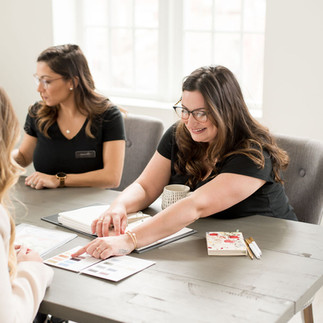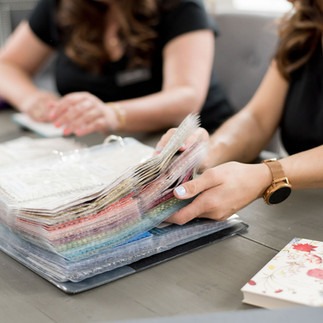I don’t know about you, but I honestly can’t think of anything I despise more than budgeting. Whether it's budgeting money, calories, or allotted screen time, it all resembles a very extreme version of hell to me. Budgeting is like the anti-hero of fun. I could never write enough bad reviews on the matter. It is a “0 out of 10, do not recommend” situation. That being said, avoiding budgeting is as detrimental as avoiding work or the dentist. We have to acknowledge these things and deal with them accordingly. So, while I can’t think of anything less romantic than condensing your dream wedding into an excel spreadsheet that you will inevitably fight over, it might still be a good idea.
According to The Knot , the average wedding costs about $28,000 - not including rings or pre-wedding events. If, after reading that, you don’t want to just ditch the wedding and opt for a month-long vacay around the globe with your lover, we can proceed…
First things first, who is paying for the wedding? Tradition is seemingly out the window here, at least in the US, as women are no longer being traded for goats and families aren’t typically offering a dowry to take their daughters off their hands. In fact, 60% of our Insta followers stated both families contributed to the wedding. Though that may seem like a great thing (yay! More money!), the people footing the bill get a lot more power than you may realize.
My mother gave me a great deal of cash for my wedding, and in return, I had 2 tables full of people I didn’t know at my 80-person reception. Let this be a warning - figure out who is contributing funds and determine if they will use their powers for good or evil before accepting. Parents typically cover between 35% to 42% of the wedding costs, which some believe gives them anywhere from 35% to 110% of the power.

Budget-wise, it is important to know who is paying and how much they're providing in order to determine...basically everything. Your budget will impact your venue, the size of your wedding, your attire, your decor, your stationary, your food and drink offerings, your music, your photographer, your signage, your wedding party, the day of the week you get married...you get the point. After collecting all your contributions, or promised contributions, you will have the overall dollar amount figure. Now, you get to participate in the sheer joy of breaking the funds down into categories to determine how much you can spend on each aspect of your wedding.
Start by figuring out your nonnegotiables - these are your priorities; the things you refuse to go without. Some popular nonnegotiables are dream venues, A+++ catering, specific dates, an open bar, outdoor ceremonies, fun music/band, masterful desserts, a huge guest list, additional late night food vendors, amazing photography, or a dream dress. Prioritize these nonnegotiables by determining their cost first, and then take it from there. If your venue, which notoriously takes up the most funds, is $15,000 of your $30,000 budget, you now know that you have $15,000 to spend on all of the other things you are willing to negotiate on.
Below is a breakdown of the traditional components in a standard wedding budget:

You can see that this chart is not extensive, and leaves 6% for “other”. It is important to determine what “other” means to you. Is it gratuity? Is it your honeymoon fund? Is it gifts for your wedding party and family? Hair and makeup? Security for your drunk cousins? We all have unique things we need / want. Websites like as Zola and Birdie are becoming increasingly popular for one of their most exciting features - the ability to ask for cash funds and experiences, along with standard household goods, right on your registry. These types of registries can offset the cost of your honeymoon or any “other” wedding necessities. If you want, you can also guestimate the amount of cash gifts you may receive in order to spend it before you get it. This is a risky gamble for a thousand reasons, but it is an option.
Next (or even first) determine your guest count. About 58% of our followers tend to have guest counts between 100 to 200 people. The average wedding guest count in 2021 was 105. Not surprisingly, the number of people in attendance has a huge impact on your budget. The price of your food, bar, stationary, favors, desserts, and more, increases with every added guest. Not to mention that more guests = bigger venue = increased venue costs. There is also the “big wedding phenomenon” to consider, which is a term we use to describe the inevitable spike in lavishness as the number of guests increases. Do you recall when Carrie Bradshaw got an amazing Vera Wang dress for her wedding in the Sex and the City movie, and all of the sudden she was having an $80 billion dollar wedding? It is like that. And it is real.
We hope you found these tips and tricks useful for budgeting your wedding. Keep in mind that your wedding planner will happily assist you in the daunting task of budgeting! If a planner doesn't fit into that pesky budget we’ve been talking about, you can try out our Master Template for Wedding Planning! Though, tbh, we still think you're better off with a planner ;)
Photo Credits: Shawon Davis Photography













Kaiser OTC benefits provide members with discounts on over-the-counter medications, vitamins, and health essentials, promoting better health management and cost-effective wellness solutions.
Obituaries near me help you find recent death notices, providing information about funeral services, memorials, and tributes for loved ones in your area.
is traveluro legit? Many users have had mixed experiences with the platform, so it's important to read reviews and verify deals before booking.